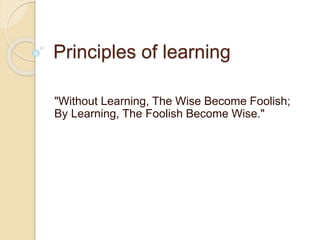
Learn Principles Wise Foolish
- 1. Principles of learning "Without Learning, The Wise Become Foolish; By Learning, The Foolish Become Wise."
- 2. WHAT IS LEARNING? Learning is the one of the important psychological process to determine the human behavior. learning is the process of accumulation of knowledge, skills and attitudes. (KSA) Learning may be through training, experience, reading, observation, discussions, electronic media including internet, experimentation, facing the new challenges, travel and exploration etc. hence training and development is more tools for learning. Learning is not a one time activity or an annual, half yearly, quarterly or monthly activity.
- 3. Learning is a continues process Learning is also an important source of motivation, Stimulation and job satisfaction Meaning of Learning Learning is simply means that permanent change in behavior through education, training, practice and experience
- 4. DIFFERENCE B/W TRAINING, DEVELOPMENT, EDUCATION AND LEARNING Training Training is concerned with the teaching of specific, factual, narrow scoped subject matter and skills. It is a formal classroom learning activities. Development Development is concerned with a broader subject matter of a conceptual or theoretical nature and the development of personal attitudes. It comprises all learning experiences, both on and off the job, including formal, classroom training.
- 5. Education Education, primarily, involves the presentation of material by the faculty to students who are learning about the subject matter. The material being studied is fundamentally well known material. Those activities known as teaching and training are included in this category. Learning Learning is the process of acquiring knowledge or skill through study, experience or teaching. It is a process that depends on experience and leads to long-term changes in behavior potential. Behavior potential describes the possible behavior of an individual in a given situation in order to achieve a goal.
- 6. GENERAL PRINCIPLES OF LEARNING Readiness Readiness implies a degree of concentration and eagerness. Individuals learn best when they are physically, mentally, and emotionally ready to learn, and do not learn well if they see no reason for learning. Getting students ready to learn, creating interest by showing the value of the subject matter, and providing continuous mental or physical challenge, is usually the instructor’s responsibility.
- 7. The principle of exercise The principle of exercise states that those things most often repeated are best remembered. It is the basis of drill and practice. It has been proven that students learn best and retain information longer when they have meaningful practice and repetition. The key here is that the practice must be meaningful. It is clear that practice leads to improvement only when it is followed by positive feedback.
- 8. The principle of effect The principle of effect is based on the emotional reaction of the student. It has a direct relationship to motivation. The principle of effect is that learning is strengthened when accompanied by a pleasant or satisfying feeling, and that learning is weakened when associated with an unpleasant feeling. , every learning experience should contain elements that leave the student with some good feelings.
- 9. PRIMACY The state of being first, often creates a strong, almost unshakable, impression. Things learned first create a strong impression in the mind that is difficult to erase. For the instructor, this means that what is taught must be right the first time. for example, a student learns a faulty technique, the instructor will have a difficult task correcting bad habits and “re teaching” correct ones. The student's first experience should be positive, functional, and lay the foundation for all that is to follow. What the student learns must be procedurally correct and applied the very first time.
- 10. RECENCY The principle of recency states that things most recently learned are best remembered. Conversely, the further a student is removed time-wise from a new fact or understanding, the more difficult it is to remember. For example, it is fairly easy to recall a telephone number dialed a few minutes ago, but it is usually impossible to recall a new number dialed last week.
- 11. INTENSITY The principle of intensity implies that a student will learn more from the real thing than from a substitute. For example, a student can get more understanding and appreciation of a movie by watching it than by reading the script. Likewise, a student is likely to gain greater understanding of tasks by performing them rather than merely reading about them.
- 12. REQUIREMENT The law of requirement states that "we must have something to obtain or do something.“ It can be ability, skill, instrument or anything that may help us to learn or gain something. A starting point or root is needed; for example, if you want to draw a person, you need to have the materials with which to draw, and you must know how to draw a point, a line, and a figure and so on until you reach your goal, which is to draw a person.
- 13. FREEDOM The principle of freedom states that things freely learned are best learned. Conversely, the further a student is coerced, the more difficult is for him to learn, assimilate and implement what is learned. Compulsion and coercion are antithetical (opposing) to personal growth. The greater the freedom enjoyed by individuals within a society, the greater the intellectual and moral advancement enjoyed by society as a whole. If no freedom is granted, students may have little interest in learning.
- 14. Since learning is an active process, students must have freedom: freedom of choice, freedom of action, freedom to bear the results of action—these are the three great freedoms that constitute personal responsibility. THANKS TO ALL